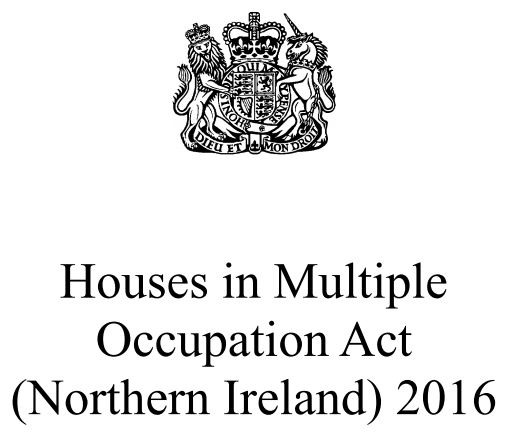Houses In Multiple Occupation Act (NI) 2016
Contents |
HMOs – Houses In Multiple Occupation
Licensing laws for Houses In Multiple Occupation (HMOs) in Northern Ireland have changed since 1st April 2019. Landlords and agents will need to know about the new licensing regime and controls.
HMOs were previously controlled by the NI Housing Executive but the new ‘Houses In Multiple Occupation Act (NI) 2016’ has moved that control to local councils and may also result in some houses becoming HMOs by default - whether that's planned that way or not.
What should be known?
First, it will be of comfort to know that professional help is available from many sources such as designers, solicitors and building consultants. HMOs are not a new thing so, whilst the legislation has changed, there are many professionals capable of providing help from day one.
Of course, it is necessary to know what an HMO is to understand the effect of this new legislation. In summary, an HMO is a property which is:
- living accommodation
- the main residence of three or more people who are from more than two households, and
- rented by at least one of the people living in the accommodation.
So for example, if a typical house in Northern Ireland is shared by students or young professionals the landlord needs to start thinking beyond the established notion that “it’s only friends sharing a house” – are there three or more tenants? If so and they’re not related then landlords need to think about how they’re going to comply with their new responsibilities.
What should be done?
Landlords will need to apply for and maintain a valid licence for each HMO they own. The fees are fairly high, and they’re an annual cost so they need to start adjusting their budgets.
They should also know that Councils can refuse a licence if they believe an area has too many HMOs already – so landlords might need to bear this in mind for future income planning.
Planning
Landlords need to prove to the Council that they have Planning Permission and Building Control Approval for their property allowing its use as an HMO. They are not covered simply because the property has always been a house - HMOs are one of the uses that N Ireland Planning legislation classes as ‘sui generis’, ie a class of its own. We can see this requirement catching out many first-time applicants, potentially leading to further enforcement action by a Council Planning department.
Conditions
Also, landlords can expect their HMO licence to come with a few conditions attached. As well as conditions relating to the physical property, tenants’ rights, anti-social behaviour and neighbourhood concerns, they can also expect the licence to limit them to a maximum number of tenants – they'll need to consider how that affects their financial planning.
Fixed penalties
Unsurprisingly, the legislators have an answer for anyone who breaches the legislation and if they choose to enforce against a landlord they’ve a few options open to them, including fixed penalties of up to £20,000.
Opportunities
Of course, it’s not all doom and gloom. The legislation has been introduced for a reason, and responsible landlords operating on reasonable margins should probably come out of this alright. In fact, if the Councils do come down hard on rogue landlords, others may well find demand outstripping supply and they could be enjoying additional income as a reward for their integrity.
--Colin Logan 17:36, 04 Apr 2019 (BST)
Related articles on Designing Buildings Wiki
Featured articles and news
Professional practical experience for Architects in training
The long process to transform the nature of education and professional practical experience in the Architecture profession following recent reports.
A people-first approach to retrofit
Moving away from the destructive paradigm of fabric-first.
International Electrician Day, 10 June 2025
Celebrating the role of electrical engineers from André-Marie Amperè, today and for the future.
New guide for clients launched at Houses of Parliament
'There has never been a more important time for clients to step up and ...ask the right questions'
The impact of recycled slate tiles
Innovation across the decades.
EPC changes for existing buildings
Changes and their context as the new RdSAP methodology comes into use from 15 June.
Skills England publishes Sector skills needs assessments
Priority areas relating to the built environment highlighted and described in brief.
BSRIA HVAC Market Watch - May 2025 Edition
Heat Pump Market Outlook: Policy, Performance & Refrigerant Trends for 2025–2028.
Committing to EDI in construction with CIOB
Built Environment professional bodies deepen commitment to EDI with two new signatories: CIAT and CICES.
Government Grenfell progress report at a glance
Line by line recomendation overview, with links to more details.
An engaging and lively review of his professional life.
Sustainable heating for listed buildings
A problem that needs to be approached intelligently.
50th Golden anniversary ECA Edmundson apprentice award
Deadline for entries has been extended to Friday 27 June, so don't miss out!
CIAT at the London Festival of Architecture
Designing for Everyone: Breaking Barriers in Inclusive Architecture.
Mixed reactions to apprenticeship and skills reform 2025
A 'welcome shift' for some and a 'backwards step' for others.























